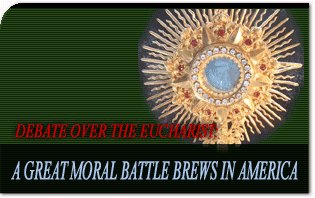
Among the many surprises that will mark 2004 is the fact that a gripping film about Our Lord, “The Passion of the Christ,” dominated the movie screens and humbled Hollywood producers by breaking box-office records.
Perhaps even surprising, however, is the current debate over who may or may not receive the Body of Christ in Holy Communion.
Indeed, no one could have predicted that Catholic politicians would feel the heat for their rejection of Church teaching while receiving the Eucharist.
Something has changed on the political and spiritual landscape where religious and moral issues like abortion, homosexuality and rampant promiscuity are shaping the debate.
As part of the reaction, over twenty bishops have now issued statements saying that politicians who claim to be Catholic must explain the ever-widening chasm between their personal lives and public policy. As Archbishop Charles Chaput of Denver, Colo., puts it, “to receive Communion, we must be in communion” with Church teaching.1
The issue is taking on such an importance that wayward Catholics and even non-Catholics are opining on the matter. Many are now criticizing the Church claiming that denying Catholic politicians Communion is divisive, imprudent or politicizing.
Profaning Christ
Such claims display ignorance about the Church and the real presence of Christ in the Eucharist.
Indeed, the media seemed to have turned the privilege of receiving Holy Communion into a “human right” that cannot be denied to those who “feel” they are in good faith. The media has unilaterally reduced the Sacrament into a mere symbol of Church community.
Nothing could be more contrary to the truth. The Church teaches that the Holy Eucharist is the actual Body, Blood, Soul and Divinity of Jesus Christ. It is only proper that the requirements for receiving Our Lord be upheld since anyone who receives unworthily is, in the words of Saint Paul, “guilty of profaning the body and of the blood of the Lord.” (1 Cor 11:27)
Being in Communion
Thus, these requirements are very clear. Catholics must be in a state of grace and display proper reverence and love for the Eucharist. Those who voluntarily deny the Church’s teachings on grave moral matters objectively break their links with the Church, create their own law, sin gravely and no longer have the necessary conditions to receive the Eucharist.
Those who receive Communion in a state of public rebellion against the Church’s doctrines objectively commit a sacrilege. It also scandalizes the faithful when this is done publicly.
Finally, those who publicly defend attitudes contrary to Church doctrine and morals, yet receive Communion, give the erroneous impression to the faithful that these attitudes are in accordance with Church teachings.
Politicizing the Eucharist
Thus, the praiseworthy attitude taken by the bishops is a pastoral duty that is entirely in accordance with Church tradition.
Those who would criticize the current condemnations as divisive or as a politicization of the Eucharist do not understand the bishops’ role or the nature of the truths taught by the Catholic Church.
The object of the moral and doctrinal truths in question is not to unite, divide or politicize but to guide the faithful. Those who want to conform are united in these truths and make these the norms of their lives. The determining factor is not the number of the faithful but the unwavering fidelity to Church teaching.
Thus, the bishops have a pastoral obligation to clarify the consciences of Catholics as to the proper conditions when Holy Communion may be received.
Anyone who insists upon receiving Communion while violating these conditions is in fact being divisive. By this erroneous public persistence, that person is the one, and not Church officials, who is politicizing the Eucharist.
“If we claim to believe in Jesus Christ and the Catholic faith,” continues Archbishop Chaput in his weekly column, “then we need to act like it—without caveats, all the way, all the time, with all our heart, including our lives in the public square.”2
Breaking the Limits
The controversy over politicians and Communion comes at a time when the Culture War that divides America is reaching a new intensity.
Court decisions, circumventing any popular participation, are mandating measures that go far beyond previous court decisions. Following in the footsteps of Roe v. Wade, the courts are not just pushing limits back but eliminating them, and standards are not just being revised but defined downward altogether.
For example, when the Supreme Court’s Lawrence v. Texas decision gave constitutional protection to sodomy, it also laid the groundwork for the overthrow of all morality in law; when the Massachusetts’ Supreme Judicial Court mandated same-sex “marriage,” it not only harmed but it redefined and distorted the sacred institution of marriage itself; and by issuing false marriage licenses to same-sex couples in San Francisco, city officials not only broke the law but manifested their blatant disregard for the rule of law.
Even vague references to God are no longer sacred. All acknowledgment of a Creator in public life is threatened or removed, and God’s Law, the Ten Commandments, must be wheeled away ignominiously from public places.
It is becoming increasingly clear that this is no longer just a matter of public policy or civil rights, it is a religious struggle since it targets the very core and practice of Christian morality.

Asking for Consistency
The growing realization that public policy is reshaping America, morality and even religion may well be one reason why so many are asking for consistency among their lawmakers and leaders.
A growing number of American bishops have responded by issuing statements calling for Catholic politicians to refrain from Holy Communion because of their public positions. Others, such as the newly appointed Bishop Robert McManus of Worcester, Mass., have clarified the Church’s unequivocal stand on homosexuality. “Catholics, especially public officials, who willingly and with approval facilitate the legal sanctioning of same-sex unions are involving themselves in cooperation with evil,” writes Bishop McManus. “Such cooperation is not free from serious moral and spiritual harm.”3
Bishop Fabian Bruskewitz of Lincoln, Neb., Archbishop Raymond Burke of St. Louis, Mo., and Archbishop John J. Myers of Newark, N.J., have gone publicly on record saying they will deny Communion to such politicians who approach the altar rail.
Bishop Thomas G. Wenski of Orlando, Fla., refuses to politicize the debate. “It is totally within our competence to say that one cannot be complicit in the injustice of denying the right to life of an unborn child or an invalid elder and still consider oneself a good Catholic. It is totally within our competence to urge our Catholic people to participate in the political life of our nation with coherence and honesty.”4
Bishop Samuel Aquila of Fargo, N.D., was no less emphatic in his April 25, 2004 homily at the Cathedral of Saint Mary. “While we may never impose the Gospel message or force someone to believe in Jesus Christ, we must always propose the truth. We cannot move into negotiation, ever, with evil.”5
A Matter of Conscience
Bishop Michael J. Sheridan of Colorado Springs, Colo., has taken the matter a step further in a recently issued pastoral letter.
Bishop Sheridan demolishes the argument that many politicians use to justify their anti-Catholic political behavior. He states that they must vote their conscience, “All people have a grave obligation to form their consciences by adhering to the truth, precisely as that truth is found in the natural law and in the revelation of God. As Catholics we have the further obligation to give assent to the doctrinal and moral teachings of the Church because “to the Church belongs the right always and everywhere to announce moral principles, including those pertaining to the social order . . . .”6
Bishop Sheridan’s letter will undoubtedly prove logical, refreshing and helpful to the faithful.
Further Steps to Take
However, decisive leadership is urgently needed. For this reason, the American TFP initiated a petition drive last August asking all the American bishops to take this decisive leadership role regarding the homosexual issue.
With the same-sex “marriage” issue now threatening to spread throughout the nation, that plea is timelier than ever. Unfortunately, too many political and church leaders are leery to confront it directly.
Transcending Politics
While political action is extremely important, there is also a dimension that transcends politics.
For any public initiative to take root in society, it needs the regenerating soil of a moral culture. It calls for a transformation in the lives of so many Americans.
Any effective rejection of same-sex “marriage” must also encompass the rampant promiscuity, indecent fashions and immoral lifestyles that undermine this nation’s ability to react.
It is a call to go beyond the regime of practical atheism in which so many live. By living as if God and his Blessed Mother do not exist, so many deprive themselves of the spiritual means that are so necessary for victory.
These are the very issues raised by the Fatima Message. Our Lady issued her call for prayer, penance and amendment of life. This call must be taken not as a replacement for effective political or social action but as the only perfect complement to it.
Indeed, many of those who have been mugged by the cruel reality of this new offensive against Christian morality are already making the connections and working toward this transformation.
A Need for a Crusade
A great moral battle is brewing and what is needed is decisive action, ardent prayers and steadfast hearts. This calls for a true spiritual crusade.
Using the same-sex “marriage” issue as a catalyst, Americans must work untiringly to create the moral climate where homosexuality is rejected. They must pressure their leaders to act urgently and decisively.
Ballot initiatives are already underway in many states that would add constitutional protection for marriage on a state level. Many organizations are rallying throughout the country to show politicians just how strong traditional marriage support is.
Above all, Catholics need to get involved now. Catholics are the largest bloc of the American population with a consistent body of doctrine on this issue that, even if only a minority is mobilized, have the best possibility to resist same-sex “marriage.”
hose who uphold traditional marriage must not be intimidated! Pro-family Americans must voice their rejection loudly and firmly, legally and peacefully, in defense of Christian morals.
Above all, they must take the Fatima Message to heart. Decisive action, together with prayer, penance and amendment of life, make up the formula for the triumph of the Immaculate Heart of Mary.
Footnotes
- Archbishop Charles Chaput, 5/26/2004, http://www.archden.org/dcr/news.php?e=81&s=2&a=1976.
- Ibid.
- Bishop Robert McManus, 5/21/2004, http://www.catholicfreepress.org/05.21.04/Clarification.html.
- Bishop Thomas Wenski, 5/03/2004, http://www.orlandodiocese.org/our_diocese/wenski/columns/politics.htm.
- Patricia Zapor, “More Bishops Weigh in on Politicians and Communion,” The Pilot, 5/21/2004, p.9.
- Bishop Michael Sheridan, 05/01/2004, http://www.diocesecs.org/bishopsOffice/pastoralLetter1.htm.

